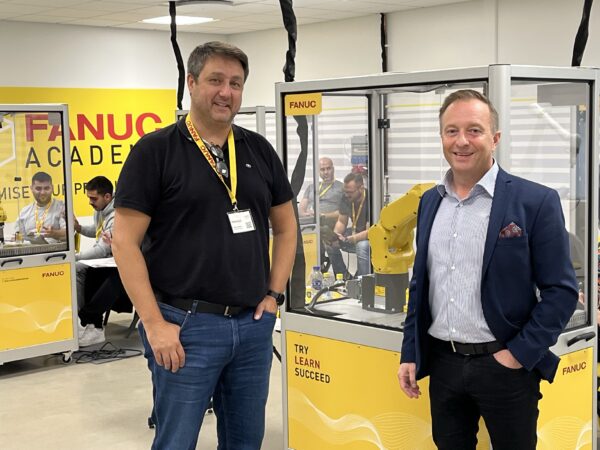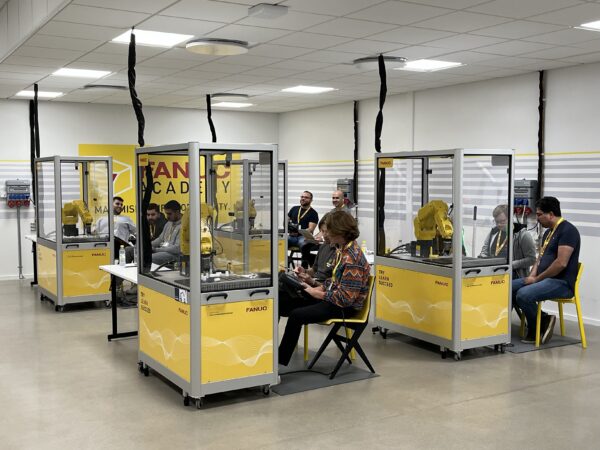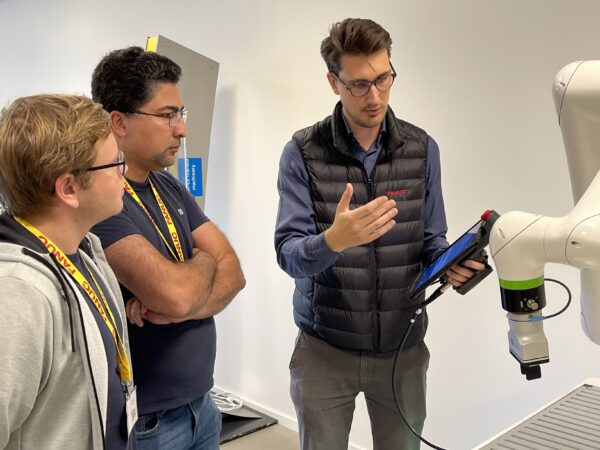Shortage of competence slows down the development of the automation industry
This year, FANUC Nordic has started a collaboration with one of the Swedish Higher Vocational Educations (YH Jönköping), to contribute to faster skills development. The demand for professionally trained engineers is high throughout Europe and there is a great shortage of them.
According to a survey conducted by the industry organization Teknikföretagen, it is precisely Automation Technicians who are predicted to be most in demand in the next few years. Sweden is at the forefront of the transition to a more sustainable industry and could increase the pace if only the skills were available.

Meet Robert Grubesic, Executive Director of YH Jönköping, and Managing Director of FANUC Nordic, Cerold Andersson, in an interview.
– With the current shortage of Automation Engineers, we see it as important that we get involved in schools that educate and where we can be helpful with both our Academy cells and our own training staff. It is important that we in the industry also contribute with training of both new and existing technologies in robotics and automation, thereby strengthening both Swedish and Nordic industry in automation. I see this as our mission for the Nordic industry so that both we and our customers will be able to hire qualified technicians in the future. This collaboration is a way for us to get involved, says Cerold Andersson, Managing Director of FANUC Nordic.
During the autumn, FANUC Nordic was visited by students from Jönköping Higher Vocational Educations (Yrkeshögskolan Jönköping). This is the second time that FANUC Nordic has received and trained students from the school’s Automation programme. For 2,5 intensive days, 20 students got to practice both practical and theoretical robot programming on FANUC’s own Teach pendants.
Robert Grubesic, tell us about your education.
We are a municipal polytechnic school with 12 programmes where the automation programmes are our “crown jewels”. YH Jönköping provides need-based education – it is the business community that basically orders its courses from us. YH Jönköping currently has two different programmes in automation: Specialization in Robotics and Specialization in Software/PLC. The first year is common to all, while the second year focuses more on each specialization. The programmes are two-year and the students can call themselves Automation Engineer Robot or Software when they are finished. The teaching is on-site located with a teacher 3 days a week and then homework and self-study must be carried out the rest of the time. The programs also include LIA (Learning at Work) on a couple of occasions.
What is required and who can apply for your education?
On the one hand, we receive applicants with previous work experience. If it is relevant (e.g. 2-3 years as an installer electrician), the applicant has great opportunities. If the applicant comes directly from upper secondary school, they need to have Mechatronics 1 or Physics 1 and Mathematics 2 as a basis. A third possibility could be for applicants to come for an interview. We can take in 20% of the class that way. Our management team then decides whether the student has good opportunities to benefit from the education or not. But for these two educations, the interview option is not needed as we have 2-3 applicants per place and a limit of 20 students per class and education.

Students focusing on programming tasks.
How do you see the shortage of automation engineers could be addressed?
The biggest problem for higher vocational education is to find the right teacher qualifications for these programmes. We purchase consultancy services, but it is a costly solution. There are both funds, applicants and commitment, but since the number of training places is based on the companies’ demand, the companies need to show an increased need – then we could expand and train more people.
These two courses are very popular and 95-100% have employment when they graduate. Many students have an employer ready long in advance.
We lack women in the programmes, but it is historically difficult to find them for these professions. We are seeing some change, but it is slow. We have 1-2 female students per year and group but we would love to see more! There are many prejudices about what the work looks like, that it is a “dirty” job, but today you can easily walk in socks in many of these facilities! It’s usually pleasant working environments, less noise, clean and not at all the same physical challenges as it used to be – these tasks are now handled by the robots themselves.
Why are you here at FANUC Nordic?
Visiting one of the largest in the automation industry is extremely rewarding for both us educators and the students themselves. It is important for us as a school to keep up with technological developments. Therefore, we need to continuously monitor it so that our students really get educated for the future. This is our second litter that we have been able to bring to FANUC for a couple of days of training. The feature has already become known internally at the school as very educational. We would like to see a continued and in-depth collaboration with FANUC as our students have shown great interest and curiosity. Many are now going out on their internships and feel that these training days have made them feel much more prepared for automation work in reality. We are extremely grateful to be here, says Robert.
What can we do as an employer?
I think the companies might be able to have a better dialogue with the Higher Vocational Educations. Be a little more open to practically also receiving students at so-called LIA places (Learning at Work). Many people probably think that an intern takes too much energy and time for them, but these almost fully trained engineers can on the contrary actually be an asset and may even be schooled so much that they become functioning employees shortly.
It would also be desirable if employers could be involved during the course of the education with, for example, study visits, practical mini-courses, guest lectures, etc. In this way, employers make contact with the students at an earlier stage and may become an attractive employer after graduation.
Many times, companies upgrade their own equipment without it being broken or directly discarded. Perhaps there are outdated training cells or equipment in general that we at the schools can still benefit from?
Benjamin and William, you’re here for the third day now – what will you bring with you from these days?
Benjamin Hagström, student: To be able to come out to companies like this during the education creates a much better understanding of reality. I knew that FANUC was a big company, but I didn’t really have any particular expectations for those days. But now I know – you are clearly good at automation and your robots! I’m soon going out to LIA where the company only uses FANUC products, so it feels good to know a little more.
William Brun, Student: During these days, we really learned what and why we should know certain things. I have also gained a much greater understanding of how big FANUC is and what FANUC stands for. We have learned a lot of programming these 2.5 days. Now I want to learn even more!
An interview made by Madeleine Laurin, Marketing Manager at FANUC Nordic.
Contact: Marketing@Fanuc.se

